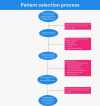Short-term surgical outcomes of rectal adenocarcinoma surgical treatment in Latin America: a multicenter, retrospective assessment in 49 centers from 12 countries
- PMID: 39710706
- PMCID: PMC11663813
- DOI: 10.1007/s00384-024-04763-z
Short-term surgical outcomes of rectal adenocarcinoma surgical treatment in Latin America: a multicenter, retrospective assessment in 49 centers from 12 countries
Abstract
Introduction: Rectal cancer is a prevalent disease that requires multidisciplinary management. Results of treatment of patients suffering from this malignancy in Latin America have been scarcely reported before.
Methods: A retrospective, multicenter study was conducted to report preoperative and operative characteristics of patients intervened for rectal cancer in centers from Latin America during 2015-2022, and the short-term results of treatment were analyzed. The study was open to any center receiving rectal cancer patients, irrespective of volume. The main study outcome was 30-day postoperative complications including any deviation from the normal postoperative course (Clavien Dindo I to V).
Results: A total of 2044 patients from 49 centers in 12 Latin American countries were included, with a mean age of 63 years. Twenty-five percent of patients were operated in low-volume centers. Twenty-nine percent of patients had a tumor located in the low rectum, and only 53% of patients had preoperative MRI for local staging. A total of 1052 patients (52%) received neoadjuvant therapy before surgery. Eighty-six percent of patients were operated by a specialized colorectal surgeon, and 31% of patients were intervened using a conventional approach. A total of 29.9% of patients presented a postoperative complication. The anastomotic leak rate was 8.9%. Fifty-eight percent of pathology reports had less than 12 lymph nodes harvested, and 22.9% of reports did not include mesorectal quality. In the multivariate analysis, neoadjuvant therapy (OR: 1.44, p-value: 0.023), urgent procedures (OR: 3.73, p-value: 0.049), intraoperative complications (OR: 2.21, p-value: 0.046), advanced tumors (OR: 1.39, p-value: 0.036), and prolonged surgery (OR: 1.74, p-value: 0.004) were found to be independently related to suffering postoperative complications.
Conclusions: This study includes information about the approach and results of rectal cancer management in Latin America at a large scale. In the future, this information can be used as a bridge to identify areas of improvement among rectal cancer patients' treatment in the region.
Keywords: Cancer; Latin America; Multidisciplinary; Neoadjuvant; Rectal.
© 2024. The Author(s).
Conflict of interest statement
Declarations. Competing interests: The authors declare no competing interests.
Figures
References
-
- Bray F, Ferlay J, Soerjomataram I et al (2018) Global cancer statistics 2018: GLOBOCAN estimates of incidence and mortality worldwide for 36 cancers in 185 countries. CA Cancer J Clin 68(6):394–424. 10.3322/caac.21492 - PubMed
-
- Kosinski L, Habr-Gama A, Ludwig K et al (2012) Shifting concepts in rectal cancer management: a review of contemporary primary rectal cancer treatment strategies. CA Cancer J Clin 62(3):173–202. 10.3322/caac.21138 - PubMed
-
- Khan SZ, Lengyel CG (2023) Challenges in the management of colorectal cancer in low- and middle-income countries. Cancer Treat Res Commun 6(35):100705. 10.1016/j.ctarc.2023.100705 - PubMed
-
- Avellaneda N, Patron Uriburu JC, Viola Malet M et al (2023) Estado actual del abordaje de pacientes con cáncer de recto en Latinoamérica. Resultados de la encuesta Carela incluyendo 385 cirujanos de 18 países en la región. Rev Arg Coloproct 34(1):14–22. 10.46768/racp.v0i0.210
-
- Avellaneda N, Smart N (2023) Creating a collaborative network in a low/middle income country region. A practical (and motivational) guide to getting started. Colorectal Dis 25(1):6–8. 10.1111/codi.16479 - PubMed
Publication types
MeSH terms
LinkOut - more resources
Full Text Sources
Medical



